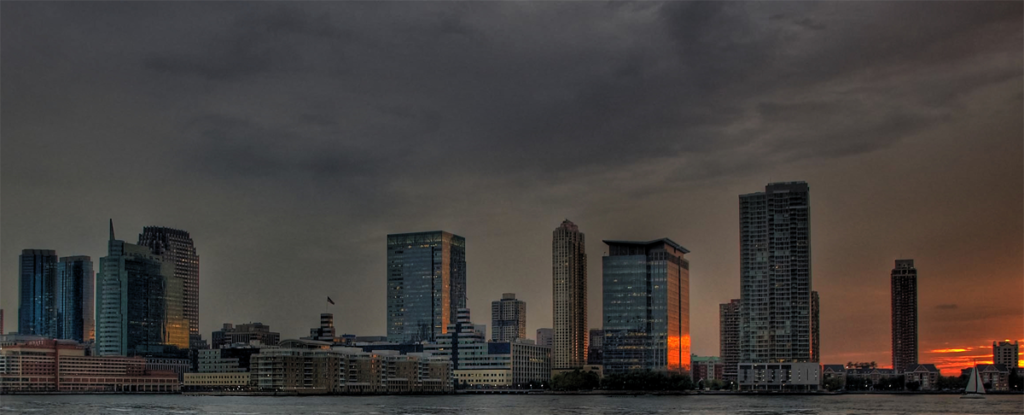Just eight days before his assassination, Dr. Martin Luther King Jr. visited the City of Newark to promote the Poor People’s Campaign.
During his visit, Dr. King returned to his long-held observation that the country consisted of “two Americas,” sharply divided by race. He explained that, in one America, “millions of young people grow up in the sunlight of opportunity” with the ability to realize their full potential. But in the other America people “find themselves perishing on a lonely island of poverty in the midst of a vast ocean of material prosperity.”
Fifty years after his visit, the two Americas persist in cities across this country, including here in the City of Newark. Indeed, King’s reference to an “ocean of material prosperity” describes the employment opportunities available now in Newark.

The City of Newark, New Jersey.
The city is home to one of the largest transportation hubs in the United States, Fortune 500 businesses, world-class research universities and cultural institutions, and a large network of hospitals and community health centers. And a majority of the people who work in Newark earn more than $40,000 a year, according to a powerful report written by Demelza Baer, my colleague at the New Jersey Institute for Social Justice.
But this prosperity is not shared by a majority of Newark residents, where 33 percent of Black residents live in poverty.
It is therefore not uncommon for me to see residents waiting to receive unemployment and other benefits in a line that extends as long as a city block, while on the other end of the street, billion-dollar construction projects are underway.
This is part of a broader, troubling picture: Newark residents hold only 18 percent of all jobs in the city. In this regard, Newark is a stark outlier among similarly situated cities. In Baltimore, for example, residents hold 33 percent of jobs. In New Orleans, it’s 46 percent. And while almost three-quarters of Newark residents are people of color, 60 percent of the people employed in Newark are white.
Importantly, these disparities in employment cannot be explained by a lack of desire or ability to work. Newark has the same labor force participation rate — the percentage of the population that is either employed or actively seeking work — as the rest of the United States, about 63 percent. However, we have higher unemployment. This leaves Newark with a troublingly high proportion of residents ready and willing to work, but unable to find either full- or part-time jobs.
Instead, these racial disparities reflect systemic failures, which require systemic solutions.
Perhaps now more than ever, the solutions are emerging from the ground up. Our organization and others are joining forces in Newark and across New Jersey to advance progressive reforms, despite the racist, xenophobic, and dangerous policies being promoted by national leaders, including President Donald Trump.
Our cities hold incredible promise to advance an agenda that unites us, and to incubate progressive solutions to finally bridging the two Americas.
This campaign is known as Newark 2020. Under the leadership of Newark Mayor Ras J. Baraka, the New Jersey Institute for Social Justice along with the Newark Alliance, Rutgers University-Newark, RWJBarnabas Health, Newark LISC, and Prudential, as well as many other companies, community organizations and partners are leading the campaign. Newark 2020 is a systems-change initiative designed to combat poverty by connecting 2,020 unemployed Newark residents to meaningful, full-time work that pays a living wage by the year 2020.
But Newark 2020 has a goal beyond that numeric target. Our ultimate aim is to build a self-sustaining public and private work force system that provides career opportunities, not just jobs. We are working as a community to create this system by identifying various career pathways to our large employers for a range of residents, from people with limited work experience to those with college degrees.
Former Newark Mayor Kenneth Gibson once said, “Wherever American cities are going, Newark will get there first.” Newark has an opportunity to serve as a bright light for progressive action, and to build a new city based on a revolution of values that Dr. King spoke of and so many Newark residents envisioned 50 years ago.
Together, we can resist and create change that brings lasting reform — from the ground up.
Share
Tweet Fifty years ago, Martin Luther King Jr. visited Newark to advance a shared vision of unity and prosperity. Today, the city’s residents are working to implement this goal.
Tweet “Now more than ever, the solutions are emerging from the ground up… Our cities hold incredible promise to advance an agenda that unites us, and to incubate progressive solutions to finally bridging the two Americas.”
Tweet “Newark has an opportunity to serve as a bright light for progressive action, and to build a new city based on a revolution of values that Dr. King spoke of and so many Newark residents envisioned 50 years ago.”

